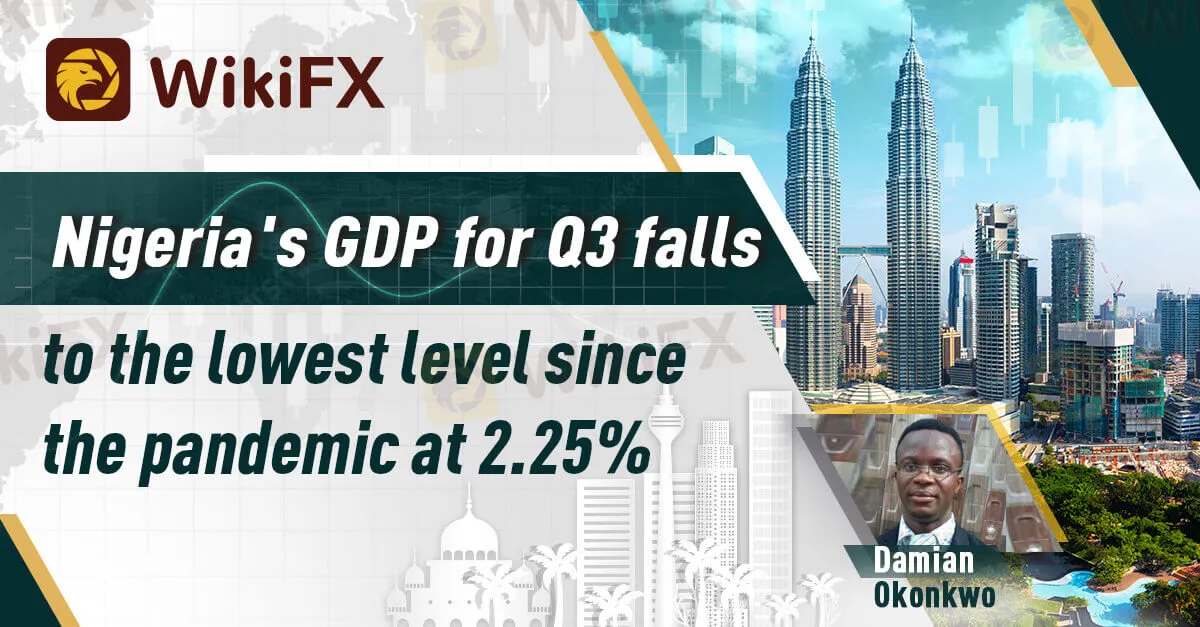简体中文
繁體中文
English
Pусский
日本語
ภาษาไทย
Tiếng Việt
Bahasa Indonesia
Español
हिन्दी
Filippiiniläinen
Français
Deutsch
Português
Türkçe
한국어
العربية
Nigeria's GDP for Q3 falls to the lowest level since the pandemic at 2.25%
Abstract:Nigeria has recorded a slowdown in the growth rate of its Gross Domestic Product (GDP) with its total GDP for the third quarter (Q3) of 2022, falling to 2.25% year-over-year (YoY) marking its lowest level since the pandemic.

By: Damian Okonkwo

Nigeria has recorded a slowdown in the growth rate of its Gross Domestic Product (GDP) with its total GDP for the third quarter (Q3) of 2022, falling to 2.25% year-over-year (YoY). This shows a massive decline by 1.78% when compared to the previous record of 4.03% growth witnessed the previous year (Q3 2021).
The growth rate in Q3 marks the lowest level seen so far in 2022, after it recorded 3.11% in Q1, followed by 3.54% in Q2 before falling to 2.25% in Q3.
According to the report released by the Nigerian Bureau of Statistics (NBS) last week's Thursday, the slowdown in the current GDP for Q3 2022 could be attributed to downturns from the recession and the turbulent economic conditions that have slowed down growth and development within the country.
However, the body further noted that there was an improvement in the GPD on a quarterly basis which grew by 9.68% when compared to the previous quarter of 2021.
Thus, the nominal GDP for Q3 2022 was given as N52.26 Trillion which is by far higher than the N45.11 Trillion recorded in Q3 2021. This marks an over 15.83% growth compared to the 15.41% growth rate recorded in Q3, 2021
The slowest growth rate came from the oil sector which recorded a negative growth of -22.67% YoY marking an over 11.94% decrease compared to the previous record in Q3 2021.
This was followed by the mining sector which declined by -21.31% marking a 10.75% decline compared to its previous record in Q3 2021.
A major improvement came from the non-oil sectors which includes: ICT, agriculture, Transportation, Real Estate, etc.
The first major improvement came from the ICT sector which grew by 15.35% compared to the previous growth of 14.20% recorded in Q3 2021.
Next was the Agricultural sector which grew by 1.34% YoY marking an increase of 0.12% when the record in Q3, 2021.
The overall contributions from the non-oil sector rose to 94.34%.
In sum, the present report has shown that country's GDP is currently at its lowest level since the pandemic. This means there has been a massive decline in productivity within the country during the just concluded quarter. The growth rate for the GDP for Q3 also stands out as the lowest growth within the past six quarters.

Disclaimer:
The views in this article only represent the author's personal views, and do not constitute investment advice on this platform. This platform does not guarantee the accuracy, completeness and timeliness of the information in the article, and will not be liable for any loss caused by the use of or reliance on the information in the article.
Read more

Will natural disasters have an impact on the forex market?
The forex market is known for its rapid responses to global events, but the influence of natural disasters, such as earthquakes and typhoons, can be less straightforward. While headlines may scream about catastrophic damage and economic disruption, the long-term effects on currency values often depend on a blend of immediate shock and underlying economic fundamentals.

Philippines Deports 29 Indonesians Linked to Online Scam Syndicate in Manila
Online scam groups in the Philippines trick Filipinos into gambling and love scams, from Manila to Bacolod, causing trafficking and pain as police fight back.

Why does your mood hinder you from getting the maximum return from an investment?
Investment decisions are rarely made in a vacuum. Aside from the objective data and market trends, our emotions—and our overall mood—play a crucial role in shaping our financial outcomes. Whether you’re feeling overconfident after a win or anxious after a loss, these emotional states can skew your decision-making process, ultimately affecting your investment returns.

Top Currency Pairs to Watch for Profit This Week - March 31, 2025
Discover the top 5 currency pairs to trade for profit this week, March 31, 2025—USD/JPY, EUR/USD, GBP/USD, AUD/USD, USD/CHF—with simple strategies and best times.
WikiFX Broker
Latest News
How Crypto Trading Transforms FX and CFD Brokerage Industry
UK would not hesitate to retaliate against US tariffs - No 10 sources
FCA Warns Against 10 Unlicensed or Clone Firms
CySEC Warns Against 14 Unlicensed Investment Websites
Top Currency Pairs to Watch for Profit This Week - March 31, 2025
Will natural disasters have an impact on the forex market?
Philippines Deports 29 Indonesians Linked to Online Scam Syndicate in Manila
Navigating the Intersection of Forex Markets, AI Technology, and Fintech
Exposed: Deceptive World of Fake Trading Gurus – Don’t Get Fooled!
AI-Powered Strategies to Improve Profits in Forex Trading
Currency Calculator







